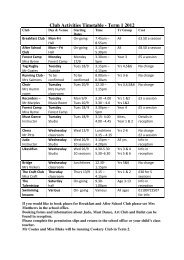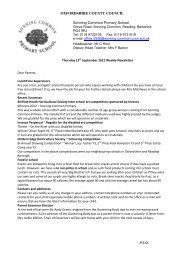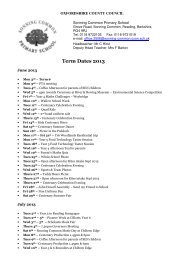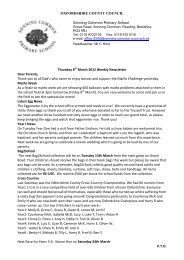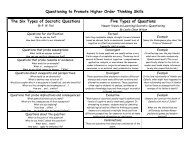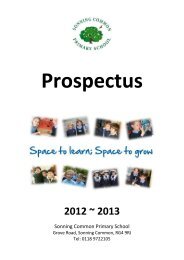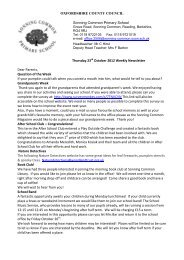2010 ~ 2011 - Sonning Common Primary School
2010 ~ 2011 - Sonning Common Primary School
2010 ~ 2011 - Sonning Common Primary School
You also want an ePaper? Increase the reach of your titles
YUMPU automatically turns print PDFs into web optimized ePapers that Google loves.
<strong>Sonning</strong> <strong>Common</strong> <strong>Primary</strong> <strong>School</strong>The school provides teaching assistants (TAs) to work alongside children when necessary. Theschool is also able to call on the professional advice of an educational psychologist, speechtherapist, physiotherapist, outreach teacher, behaviour support and social services.Children with learning difficulties are identified by parent and teacher observation andassessment and referred to the Special Needs Co-ordinator. The school follows the DSFCCode of Practice (described in the Special Needs Policy).The progress of children with SEN is carefully monitored and Individual Education Plans (IEP)prepared as necessary. Parents are invited to attend reviews of their child’s progress towardsmeeting targets.A special needs register is kept and updated termly. Success is measured through theprogress made by individual children towards achieving the targets set out in their IEPs. Eachyear some children will make such significant progress that they are removed from theregister.HOME LEARNINGLower <strong>School</strong> Department (Key Stage 1)Children are encouraged to take home a book each day to share with an adult. They mustreturn it before taking another one. They may occasionally be asked informally to “find outabout something at home” and given activities to take home which support their learning.Lower Junior Department (Key Stage 2)Children are given the opportunity to take a book to read at home. There are regular tablestests and children will be asked to prepare "talks" on a subject of their own choice andprepare book reviews.A list of activities to be done as home learning will be given for some projects from whichchildren can select the areas that interest them. They will, however, be given an item fromthis list as home learning each week. It is hoped that parents will support children in theirwork whilst encouraging personal organisation and responsibility.Upper Junior Department (KS2)Children will have regular tables and spelling tests. In addition they will be asked to preparesome pieces of work for presentation to the class, prepare "talks" and debates for the classand they should read at home regularly.It is expected that upper juniors will pursue a topic for project work that may take a variety offorms and that they will carry out some independent study and research, with support fromparents. It is hoped that this will provide opportunities for personal organisation, developingresearch skills, making choices and allow them to take independent responsibility for theirown work.To inspire with the joy of life-long learningwww.sonningcommonprimary.co.ukPage 15 of 23



